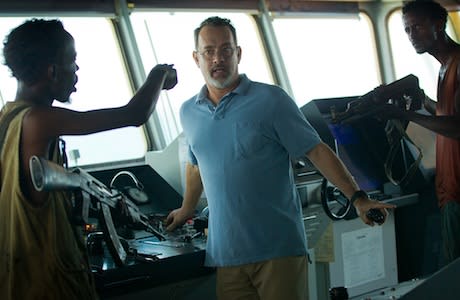With heavy hands and shaky cam working overtime, Paul Greengrass delivers a patronizing pat on the back to the American people disguised as a sophomoric critique of globalization. The topic de jour is Somali pirates. How could Hollywood resist a set of sympathetic antagonists, the description of which suggests a blend of nostalgic romanticism and real-world issue mining? They couldn't, so expect to see more of these hungry symbols of progress gone awry on the big and small screens until someone figures out how to give them their fish back or the next newsworthy, morally ambiguous aggressor shows up. But this movie is only sort of about them; it's not called Captain Muse.
As all the marketing campaigns make sure you're aware of, Tom Hanks stars as the titular Captain Phillips, in this "based on a true" story. Affronts to national security (read: ego) don't sit well with the U.S. government, and Greengrass uses this tale of the first American cargo ship hijacked in 200 years to demonstrate what happens to people who screw with the Red, White and Blue, as well as to celebrate how very brave all the sailors were in the face of danger, of course.
First, we meet the players: Phillips and his crew, just trying to do their jobs delivering cargo, as well as Muse (Barkhad Adbi) and his gang, just trying to do the same for their bosses. Greengrass, working from a script by Billy Ray (not Cyrus), derived from the account by Richard Phillips (spoiler alert: he wrote a book), skimps on the personal backgrounds and motivations of most characters on both sides of the conflict, displaying greater concern for depicting how they behave in a group dynamic and under pressure.
The director of United 93 tacks on a subplot involving Phillips calling home to his wife (a completely underused Catherine Keener), as they've both been so worried about the news reports of piracy in the area he'll be sailing. But its primary function is not emotional grounding; it's to indicate how professional Phillips is for being so up on his duties and safety protocols.
His stalwart, stick-in-the-mud, rulebook-thumping is credited with keeping the situation from getting uglier than it did, with early scenes of Phillips and his wandering accent battening down the hatches and preparing his flippant crew for the worst.
Captain Phillips is lethargic, pandering and lazy. The "intimate realism" of the sort of purposely unstudied cinematography Greengrass favours in this film is a timesaving excuse to ignore the artistry of framing. Only in the wide shots, after greater forces are brought into play, is there a firm sense of control and spatiality. Intentional as that tactic is — we get it: the military is in charge — it's a tactic of manipulation on par with a score practically begging the audience to feel tension that's otherwise absent.
Viewers sporting cause bracelets or flags planted on their front lawns will be the most vocal supporters of this desultory Oscar bait. For the rest of us, unless you want to see Hanks make his "oh Jenn-AY!" face without watching the "box of chocolates" scene again, don't waste your time.
(Sony)As all the marketing campaigns make sure you're aware of, Tom Hanks stars as the titular Captain Phillips, in this "based on a true" story. Affronts to national security (read: ego) don't sit well with the U.S. government, and Greengrass uses this tale of the first American cargo ship hijacked in 200 years to demonstrate what happens to people who screw with the Red, White and Blue, as well as to celebrate how very brave all the sailors were in the face of danger, of course.
First, we meet the players: Phillips and his crew, just trying to do their jobs delivering cargo, as well as Muse (Barkhad Adbi) and his gang, just trying to do the same for their bosses. Greengrass, working from a script by Billy Ray (not Cyrus), derived from the account by Richard Phillips (spoiler alert: he wrote a book), skimps on the personal backgrounds and motivations of most characters on both sides of the conflict, displaying greater concern for depicting how they behave in a group dynamic and under pressure.
The director of United 93 tacks on a subplot involving Phillips calling home to his wife (a completely underused Catherine Keener), as they've both been so worried about the news reports of piracy in the area he'll be sailing. But its primary function is not emotional grounding; it's to indicate how professional Phillips is for being so up on his duties and safety protocols.
His stalwart, stick-in-the-mud, rulebook-thumping is credited with keeping the situation from getting uglier than it did, with early scenes of Phillips and his wandering accent battening down the hatches and preparing his flippant crew for the worst.
Captain Phillips is lethargic, pandering and lazy. The "intimate realism" of the sort of purposely unstudied cinematography Greengrass favours in this film is a timesaving excuse to ignore the artistry of framing. Only in the wide shots, after greater forces are brought into play, is there a firm sense of control and spatiality. Intentional as that tactic is — we get it: the military is in charge — it's a tactic of manipulation on par with a score practically begging the audience to feel tension that's otherwise absent.
Viewers sporting cause bracelets or flags planted on their front lawns will be the most vocal supporters of this desultory Oscar bait. For the rest of us, unless you want to see Hanks make his "oh Jenn-AY!" face without watching the "box of chocolates" scene again, don't waste your time.
